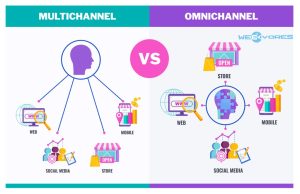Do you want your business to stay relevant and more competitive? Do you want loyal customers that contribute to increasing your company’s revenues? If you responded yes to any of the preceding questions, then Omnichannel Marketing is the next approach to implement.
Definition
Omnichannel marketing is a unique strategy that focuses on providing a personalized customer experience across all online and offline channels. Always keep in mind that omnichannel marketing, like any great marketing, is all about the consumer. The goal should be to make the consumer experience as simple and quick as possible. Develop an omnichannel marketing plan by looking at your products/services from the consumer’s perspective.
Benefits for your company
With an Omnichannel approach in your marketing, sales, and service strategy, you’ll be reaching your customers where they are instead of waiting for them to find you.
In this way, your prospects will find it easier to make a purchase because they can find your product on the all the platforms they use, which increases your profits.
When a customer contacts a company, they imagine all your support channels as one; to them, these services are no different. If your customers believe they have multiple ways to contact your customer support and sales teams, they will be happier in the long run.
Steps to follow when using omnichannel marketing
First, understand your customers by observing the kind of platforms they frequently use to shop, their purchasing behavior, the challenges they face while shopping, how they connect with your brand at each touchpoint, and the devices they use to shop. Gather as much information as possible about your potential customers, including their age, gender, family situation, location and occupation.
Second, analyze the data to create a solution for every problem your customers encounter. With this information, you will be able to personalize your campaigns. Consequently, you will attract and keep the attention of your target audience.
Third, select the right marketing tools to implement your strategy from planning to execution.
Finally, train your employees to offer a consistent experience to your customers, so that you ensure your strategy has an impact everywhere.
Omnichannel vs Multichannel Omnichannel Marketing vs Multichannel
Now that you have an idea about Omnichannel Marketing, you should be able to distinguish it from Multichannel Marketing.
In a nutshell, omnichannel marketing considers the fact that a customer’s journey may cover numerous channels and evaluates how to provide the greatest experience when they navigate between them. It’s immersive, and it prioritizes the customer over the product.
On the other hand, multichannel, distributes content and advertisement across various channels. It allows the consumers to choose where they want to interact with the brand. It is characterized by the implementation of campaigns in several advertising media: television, postal mail, print, email, SEO, website, and social networks. In this type of strategy, we seek to multiply the points of entry of the message. This helps to infiltrate more effectively the memory of our target audience. It is important to integrate our strategies in a relevant way so that our potential customers find added value on each platform. However, this strategy provides isolated experiences based on the channel.
In conclusion, an omnichannel experience presents a report of each platform and device a customer will use to interact with your company. It also ensures a consistent and pleasant experience across all platforms. Our team at Webivores will gladly help you implement an omnichannel strategy for your business. Contact us today!




